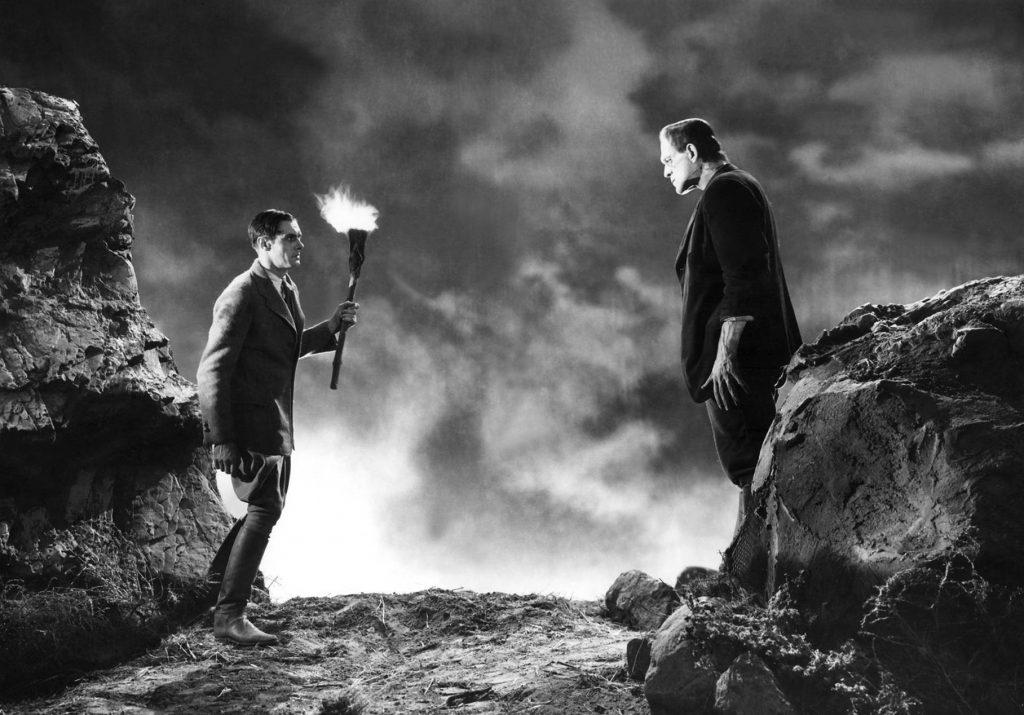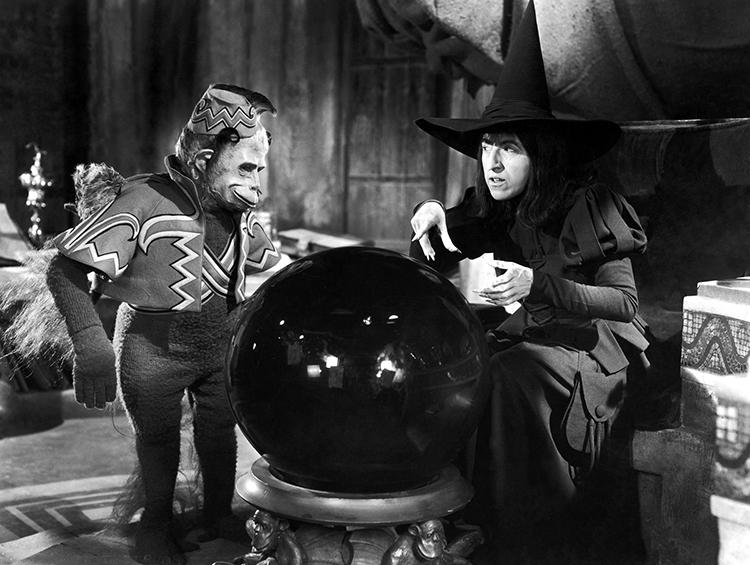
The night is for id stuff set free, as Young Goodman Brown learns when he stumbles upon an unholy sabbath in a story set in the dark woods outside Salem Village. The stalwart Puritan is astonished to see that among “grave, reputable, and pious people, these elders of the church, these chaste dames and dewy virgins, there were men of dissolute lives and women of spotted fame, wretches given over to all mean and filthy vice, and suspected even of horrid crimes.” In the moonlight, you see, Mr. Brown, one meets spontaneous usurpers, rebels who breach the confines of convention, mobs with a passionate, indiscreet sense of justice, which only feels like injustice if you, yourself, happen to be a monster left over from the passionless, equivocating daylight. This is the time when goosebumps prickle. Nathaniel Hawthorne knew all about that. And so did the Ku Klux Klan. And so did Josef Goebbels. As atmospheric masters, one and all, the comparisons work just fine.
Thanks to the horrific associations they conjure, any floodlit, outdoor, nighttime political rally can bring on a reflexive chill. To frighten? And by frightening, impress? Was that the message behind Amy Coney Barrett’s nighttime gathering of Republican conspirators in a strange, after hours Supreme Court swearing in ceremony? Why the inverse mimicry of an earlier, afternoon super spreader event? Who knows, for sure. But it obviously didn’t have to happen exactly just then and someone working at, or with, the White House certainly has a blunt edge flair for stagecraft. The red, white, and blue Lincoln Monument flyover on July 4, 2019, for instance. Or how the camera rolled graciously backward in front of the Trumps like an obsequious, hurrying footman as the first couple strode the long portico on their way to Donald’s acceptance speech. Or the nod to Leni Riefenstahl: a helicopter descends from the heavens, carrying the savior, miraculously cured, pumped full of steroids and fetal stem cells, returning, panting and victorious, to the Eisenhower balcony so to remove the much abused mask, a la Phantom of the Opera.
When it comes to the hard stuff, the administration is hapless, hopeless. But when it comes to the easy stuff, like putting on a mediocre bit of showbiz that any community theater director and an unpaid cast could put to shame, the administration does, at least, succeed in fulfilling crass expectations. You would expect a little better, though, given the budget and the scale of the scene and the top-drawer props on hand.

The Wizard of Oz, Victor Fleming, 1939
When Ruth Bader Ginsburg died on September 18, 2020, the lights of the right wing blogosphere lit up with the power of a thousand suns. As you would expect, plenty of anti-Semitic hairballs promptly came shooting up. One ”anonymous” at NewsScoopUSA, for example, joining an already giddy and long threaded chorus, noted at 11:16 PM on the day of her death that “she was so Jewish she looked like a giant mosquito.” An A + observation, there, from a vigilant student of Ashkenazim and bugs. (And one need not prowl the far corners of 4chan or Qanon to find other, ready examples: Republican Senator David Perdue is an apparently equally gifted and entirely mainstream pupil of physiognomy, as demonstrated by Perdue’s digital manipulation of images of his challenger, Democrat Jon Ossoff.) Another popular chant found on those boards, on the occasion: “ding, dong, the witch is dead!” Heed the good news. The oppressor has been overthrown and the citizens are now set free. A time of rebellious jubilation is at hand. The spell is broken. Hallelujah. Happy dance.
It may take more than average feat of metempsychosis to squeeze yourself into the head of someone who thinks that our genius bubbie from Brooklyn was any sort of fascist: but that’s what plenty of commentators, conveniently shrouded in layers of internet anonymity, shouting from the shadows, certainly believe she was. And here the old tropes of anti-Semitism–Jews are everywhere, Jew control everything–crisscross in a peculiar way with a sacred American origin myth about the democratic will.
The myth, to wit: we began life in New England as hard working, plain spoken, agrarian innocents. When our rights were threatened by ranks of Empire enforcers, by an evil, oncoming, monolithic phalanx of red-coated stormtroopers, by zombie androids of the sophisticate King, a little, ragtag band gathered on the green at Lexington, Massachusetts, and fired muskets, hoping against hope, acting out of defiance, out of self-defense. And whaddaya know. In time, In spite of the long odds, with mulish grit, guns, God’s grace, and a revolutionary commitment to the sacred song of liberty, we the people prevailed. Monarchical, equestrian statues came a’ tumblin’ down and a new eye appeared at the top of the pyramid.
We saw–we see–ourselves as a nation of righteous and all powerful anti-authoritarians, in other words. Wrapped in that blessed cloak, we grant ourselves permission to do just about anything, without the burden of contradiction. This doublethink role is so natural, so pleasing, so reliable, that it gets played relentlessly, even on–perhaps especially on–entirely inappropriate occasions. Why did the South secede from the union? To preserve its freedom to buy and sell others, obviously. Why were Native Americans slaughtered on the plains? Because we had a right, a Manifest Destiny, to expand freely ever westward in search of El Dorado–and if that right had to be preserved by cavalry regiments, well, we shall pray for the heathen souls crushed under thundering hooves. Woodrow Wilson goes out a-prowling for anti-war protestors, looking to lock them up, because his war is one that will, he says, save democracy. Joseph McCarthy needs to blacklist Hollywood types so we can all take deep breaths, free of the fear of Communist infection. And on. And on. And on. Once you spot one example, the rest of the bingo card fills right up.

Justice Clarence Thomas delivered the oath to Barrett during her moonlight swearing-in soiree. President George Bush I, in a craven mistake of racial identity politics, selected him to replace the departed Thurgood Marshall, a giant of American jurisprudence. Thomas then famously claimed, twisting agonizing history beyond agonized recognition, that his controversial confirmation hearing was a “high tech lynching of an uppity black man.” This from a man who benefitted in his lived experience from affirmative action, but who thinks it is illegal, and who takes full advantage of Marshall’s afterlife stardust. An alleged sexual predator, he has no remorse about playing the piteous victim. The true predator, he says, employing authoritarian-as-anti-authoritarian logic, is an African American woman who is in collusion with an imagined liberal left and the feminist sympathizing media. It’s me, me, me being dragged through the mud and tortured here: not her.
The scene of the imaginary victim played out once more at the confirmation process of Brett Kavanaugh, when, putting frat-boy spin on Thomas’ original argument, Kavanaugh suggested that he, too, was a victim of an angry mob. Made up of hysterical feminazis, it was the same imaginary mob that hounded Thomas, just few decades later and with a different target, with different prey. Speaking up for the oppressed, party hardy, hanging Chad set, Kavanaugh barely escaped these angry, tentacular, left-wing tyrants; and as a consequence, he now feels free to embrace Trump’s frothing notions about the fraud that inheres in absentee ballots. He is okay, Brett says, when it comes to throwing valid ballots away and thus throwing the election to the boss, who threw him quite an entitled, belligerent lifeline during his confirmation hearings. He would never say it that way, of course. He will instead defer to the authority of the“unitary executive branch.”
And somehow these tailored identity narratives of fake persecution always tend to chime perfectly with those peddled by a President for whom nothing is ambiguous or worthy of critical examination. Even before Barrett’s confirmation hearing began, her handlers had settled on a variant of the now familiar script. She, as if in some sword and sandal epic, would play the persecuted Christian hero-martyr, sitting before the cruel, soulless senators of Rome. On and on went the Republican members of the Judiciary Committee, praising her conviction and condemning those who would assail her religion, even though not a single questioner from the Democratic side ever actually made such an attack. Not once. And since no attack came, one had to be invented so to justify Barrett’ unsubtle oath to discriminate, to subjugate, and to enforce others to obey her idiosyncratic, anti-democratic, otherworldly law.
In terms of actual persecution, her position is more than reminiscent of Trump’s pretend horror about wordless, red Starbucks cups and the fantastical war on Christmas that those cups represent. It is more than reminiscent: it’s the same thing. And that is the point. Whether the threat is real or not, Barrett gets out the bunker-mentality vote. In the rotund words of crocodile-teared Senator Lindsey Graham, addressing his political base: “To all those conservative women who go through hell for being conservative, who get beat up by the mainstream media for embracing your faith, by being pro-life, being traditional in your family structure, you’re a winner tonight. There’s a seat at the table for you.” So Barrett is more than a justice. She is also a dream of one, a product of the Federalist Society’s farm league who learned to talk like a smart-sounding liberty-loving badass in the fight against fascists like Ginsburg. And now she sits inside the echo chamber that has become the Supreme Court. Does it surprise anyone that, when asked, she bobbled her answers about the Bill of Rights, the First Amendment in particular, even when asked by a sympathetic, fellow cultural traveller?

